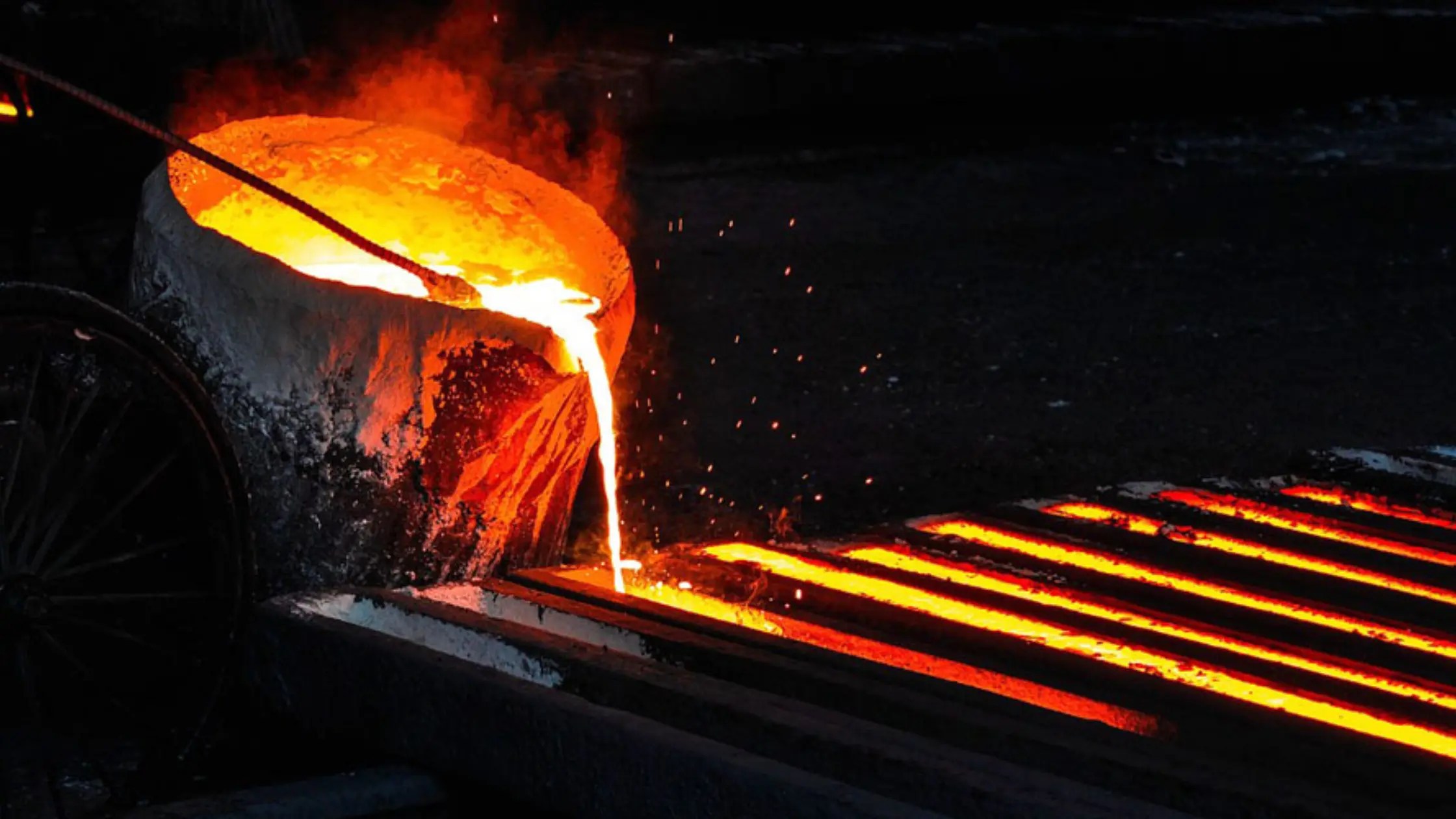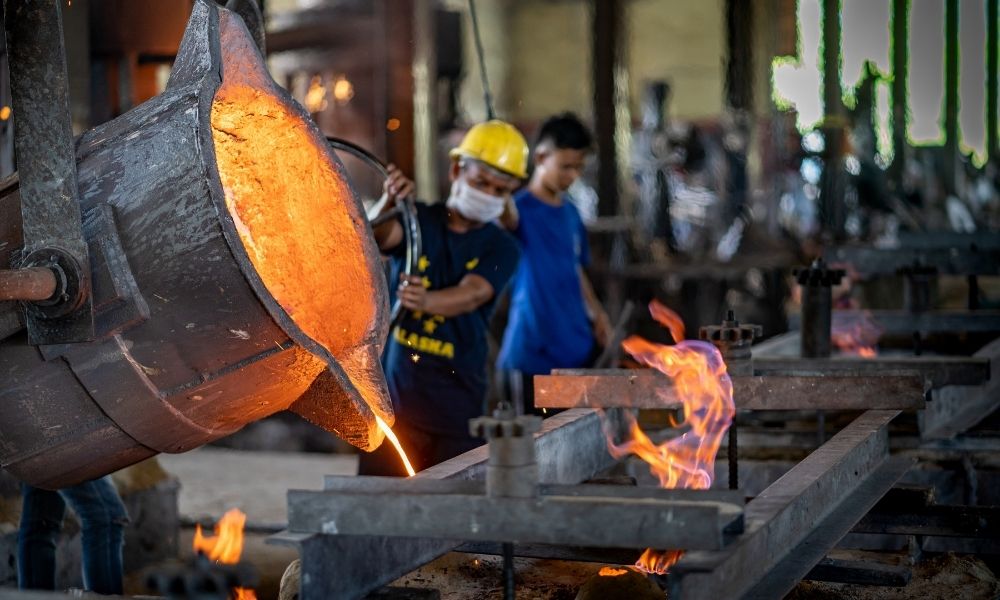Important Reasons to Choose a Metal Foundry for Industrial Projects
Wiki Article
A Comprehensive Guide to Metal Casting: Benefits and Services Offered by Foundries
Metal casting is a vital process in different markets, providing various benefits through the services of foundries. These facilities transform molten metal into durable and precise elements, dealing with specific customer requirements. By utilizing innovative innovations, foundries guarantee quality and performance in production. The complexities of metal casting and the diverse methods entailed raise essential inquiries about its duty in contemporary manufacturing. What technologies lie in advance in this necessary area?Understanding the Metal Casting Process
The metal casting procedure is a fundamental method used in producing to develop complicated shapes and parts. This method entails putting liquified metal right into a mold and mildew designed to form the wanted things. The process starts with pattern development, which acts as a design template for the mold and mildew. Aluminum Foundry. Numerous materials, such as sand, metal, or ceramic, are used for mold-making, depending upon the specific demands of the casting
When the mold is prepared, molten metal is poured right into it and allowed to cool down and strengthen. After solidification, the mold is gotten rid of, revealing the actors component. Numerous techniques, including sand casting, investment casting, and die casting, are used, each matched to different applications and products. Quality control actions, such as inspections and screening, are vital to ensure the end product meets requirements. On the whole, the metal casting process plays an essential duty in generating parts for sectors varying from vehicle to aerospace.
Key Advantages of Metal Casting
Metal casting offers significant benefits that make it a favored production approach in numerous markets. Its design flexibility and precision allow for elaborate shapes, while cost-efficient mass manufacturing boosts performance. Furthermore, the convenience and strength of products used in casting add to the longevity of the last items.Style Versatility and Precision
Releasing exceptional design flexibility and accuracy, metal casting allows designers and designers to create detailed shapes and attributes that would certainly be challenging or impossible to accomplish with various other producing techniques. This ability enables the manufacturing of complex geometries, internal frameworks, and great details that enhance product capability and looks. In addition, different casting strategies, such as sand casting, investment casting, and die casting, give more choices for modification, suiting varied material homes and task needs. The versatility of mold and mildews allows alterations during the design phase, improving the change from principle to end product. Eventually, metal casting stands out for its capability to provide high-precision components, making it an important process in sectors varying from auto to aerospace and past.Affordable Mass Production
Economical automation stands as one of the key advantages of metal casting, allowing makers to produce big quantities of elements at a lower cost each. This efficiency develops from the capacity to develop complex mold and mildews that can be reused multiple times, significantly reducing setup and functional expenses. Additionally, metal casting processes, such as sand casting and die casting, allow for high throughput, making it possible to satisfy the demands of massive manufacturing runs. The reduced material waste and power consumption better boost cost savings, making metal casting an appealing option for sectors needing mass components. Generally, the economical nature of metal casting settings it as a preferred technique for makers going for financial performance in their production procedures.Product Adaptability and Toughness
Among the standout features of metal casting is its impressive product versatility, which enables making use of a large range of metals and alloys. This flexibility enables manufacturers to choose materials that best suit their details applications, from light weight aluminum and bronze to iron and steel. Each metal uses distinct homes, consisting of differing degrees of stamina, deterioration resistance, and thermal conductivity. As a result, metal casting can produce elements that satisfy rigid efficiency demands throughout diverse markets, such as auto, aerospace, and building. In addition, the stamina of cast steels can be boosted via different treatment processes, ensuring toughness and long life. Metal Foundry. Overall, the combination of material adaptability and intrinsic strength makes metal casting a recommended option for producing high-grade componentsKinds of Metal Casting Techniques
Metal casting encompasses a range of methods that satisfy different manufacturing demands and material residential properties. Common techniques consist of sand casting, which uses a sand mold for complex forms, and financial investment casting, recognized for its accuracy and surface finish. Pass away casting is one more strategy that uses high-pressure shot of liquified metal right into mold and mildews, perfect for mass manufacturing of tiny components.Shell molding offers a quicker alternate, utilizing a resin-coated sand to develop thin-walled molds, while lost foam casting enables complex layouts without the demand for a core.
Furthermore, constant casting is made use of for producing long areas of metal, such as sheets or bars, by strengthening liquified metal in a continuous process. Each technique is and offers unique advantages picked based on aspects like the required detail, production volume, and product type, making certain remarkable end results in metal manufacture across various markets.
The Duty of Foundries in Metal Casting
Shops play an essential role in the metal casting process, functioning as the centers where molten metal is changed into completed products. These specialized facilities are equipped with the essential devices and technologies to manage different steels, making certain premium outcomes. Shops are accountable for numerous vital features, consisting of melting the metal, putting it right into molds, and enabling it to solidify.Additionally, they keep stringent safety and security and environmental standards to shield employees and minimize environmental influence. Knowledgeable technicians and designers collaborate to maximize casting processes, improving performance and decreasing waste. Shops likewise take part in quality assurance measures, making sure that the end products meet particular tolerances and specifications. This quality control is important for markets that rely on accurate parts, such as auto and aerospace. Because of this, factories add significantly to the general manufacturing landscape, allowing advancement and growth across numerous sectors.
Customized Metal Casting Providers
Personalized metal casting solutions use customized layout solutions that meet specific client needs. These solutions also offer product option competence, making sure the ideal metal is picked for the desired application. Such versatility and understanding improve the general quality and performance of the final product.
Customized Style Solutions
Customized design options in metal casting give suppliers with the flexibility to produce components that meet specific performance and visual demands. Shops use tailored services that allow customers to specify measurements, shapes, and surface area finishes to attain wanted end results. This personalization procedure typically includes partnership in between designers and designers, making certain that the websites end products line up with functional demands and sector requirements. Advanced technologies, such as computer-aided style (CAD) and simulation software application, enable exact modeling and screening of elements prior to production, enhancing and minimizing mistakes efficiency. By leveraging customized style options, businesses can maximize performance while minimizing waste and expenses, eventually bring about a more one-upmanship on the market. This adaptability is vital for sectors calling for special applications and requirements.Material Choice Competence
When choosing products for metal casting, proficiency plays a vital role in ensuring that the ideal selection aligns with both performance demands and cost-effectiveness. Factories employ skilled experts that recognize the properties of numerous metals and alloys, permitting them to advise perfect products for details applications. Aspects such as stamina, deterioration resistance, and thermal conductivity are meticulously thought about to satisfy the customer's demands. Furthermore, sector patterns and advancements in material scientific research educate these decisions, enabling factories to stay competitive. By leveraging their competence, factories can help clients in guiding via complex material choices, eventually leading to boosted item top quality and reduced manufacturing prices. This customized knowledge is important for achieving successful end results in custom-made metal casting solutions.Quality Control in Metal Casting
Quality control in metal casting is important to ensure that the end products satisfy the required specifications and efficiency requirements. Factories utilize a variety of techniques and methods to guarantee the finest quality of actors parts. This procedure begins with strict check my blog material examinations, verifying that basic materials abide by market requirements. Throughout the casting process, real-time surveillance and testing are carried out to examine parameters such as temperature level, mold and mildew honesty, and dimensional accuracy.
Applications of Metal Castings Across Industries
Metal castings play a crucial role in different sectors, functioning as the foundation for many applications. In the automotive field, cast components such as engine blocks and transmission real estates are necessary for vehicle performance and integrity. The aerospace sector depends on precision spreadings for important components that assure safety and performance in flight. Additionally, the construction market uses metal spreadings for fixtures, installations, and structural elements, enhancing the longevity of structures and infrastructure.In addition, the power sector gain from castings made use of in wind turbine blades and various other devices essential for power generation - Aluminum Foundry. The clinical area likewise utilizes metal castings in instruments and gadgets, showing the versatility of this production process. On the whole, metal spreadings are essential to the functionality and advancement of diverse fields, showcasing their relevance in modern innovation and facilities advancement
Often Asked Inquiries
What Products Are Commonly Used in Metal Casting?
Usual materials used in metal casting consist of light weight aluminum, iron, steel, brass, and bronze. Each material provides special residential properties appropriate for different applications, enabling suppliers to choose the finest alternative based upon strength, weight, and rust resistance.The length of time Does the Metal Casting Refine Generally Take?
The metal casting procedure normally takes several hours to a couple of days, relying on elements such as the intricacy of the layout, from this source type of metal used, and the details casting technique utilized by the foundry.
What Is the Environmental Effect of Metal Casting?
The ecological effect of metal casting consists of power consumption, discharges, and waste generation. Shops commonly apply procedures to alleviate these impacts, such as recycling products and using cleaner modern technologies to lower their eco-friendly footprint.Can Metal Casting Be Provided For Small-Scale Projects?
Metal casting can without a doubt be done for small-scale jobs. Various factories satisfy such demands, using personalized options that accommodate minimal production runs while maintaining high quality and accuracy in the last products.What Are the Security Steps in Metal Casting Foundries?
In metal casting shops, safety steps consist of personal protective tools, correct ventilation, training on equipment use, emergency situation treatments, regular upkeep checks, and adherence to sector safety requirements to reduce dangers related to molten metal and hazardous materials.Furthermore, metal casting processes, such as sand casting and pass away casting, permit for high throughput, making it possible to satisfy the needs of large-scale production runs. One of the standout characteristics of metal casting is its impressive material versatility, which enables for the usage of a broad array of alloys and metals. In addition, continuous casting is used for creating long sections of metal, such as sheets or bars, by solidifying liquified metal in a continual procedure. Foundries play a critical role in the metal casting process, offering as the facilities where liquified metal is transformed into finished items. Typical products utilized in metal casting consist of light weight aluminum, iron, bronze, brass, and steel.
Report this wiki page